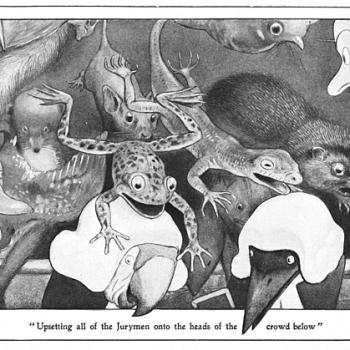With all his heart Zhaozhou asked his teacher Nanquan, “What is the way?”
Nanquan replied, “Ordinary mind is the way.”
Zhaozhou pushed, “Should I direct myself toward it, or not?”
Nanquan responded, “If you try to turn toward it, you betray your practice.”
Frustrated, Zhaozhou asked, “How can I understand the way if I don’t turn toward it?”
Nanquan explained, “The way does not belong to the realms of knowing or not-knowing. Knowing is delusion. Not-knowing is blankness. When you have attained the way, you will find it as vast as outer space. How can this be approached in terms of right and wrong?”
With these words Zhaozhou awakened.
Gateless Gate, Case 19
I so love this case. On the one hand it guides us to the fundamental matter, correcting us as we veer from the realizations that quickly become boundaries, and with that traps on our way. And on the other hand it is a full expression of the fundamental matter itself. So, yes, I love this case.
It comes from the early strata of Zen’s formation in the early Middle Ages. Nanquan Puyuan flourished between the middle of the Eighth and the middle of the Ninth centuries. He was a disciple of Mazu Daoyi, and a principle figure in what we call the golden age of Zen. His encounters with his disciples and others have become many of the classic koans, four times in the Gateless Gate, six times in the Blue Cliff Record, and another three times in the Book of Serenity.
His disciple Zhaozhou Congshen who is here at a critical turning point on his own path could be argued to eventually surpass even his great teacher. At the time of this encounter Zhaozhou was about twenty and had been in the master’s monastery for two years.
Soon after this encounter he would embark on a pilgrimage to marinade his insight through encounters with many of the eminent masters of the age as well as throwing himself into more years of practice. Perhaps forty years after his awakening Zhaozhou settled in at a ruined temple and began accepting disciples. The stories say he lived another forty years.
While Zhaozhou’s direct line did not survive, his teaching would continue in the legends of the Zen way and especially within the great koan anthologies. He’s featured five times in the Gateless Gate and another twelve times in the Blue Cliff Record.
With that the case itself. Robert Aitken the first Westerner I know to be fully authorized as a teacher of the koan way had his own encounter with these questions. He relates it in his commentary on this case. He tells about while studying in Japan with Hakuun Yasutani, Soen Nakagawa Roshi was scheduled to visit and was willing to take questions about Zen and its practices.
Aitken was ill the day of the visit. But he had a question that he passed on through his wife, Anne. “Should I use effort or not?” It’s a real question, especially for those of us schooled in the ways of just sitting, and all the concerns about “gaining mind” and such. When she returned Anne told him the master said, “That is a very difficult question.”
And so it is. Gaining mind. Sitting like a lump on a log. Both appear to be mistakes. But how do I start? Yes, it is difficult. How do I start?
There are several commentaries in English on the Gateless Gate collection. So far it is the only koan anthology to have such richness. The latest anthology of commentaries is by Gyo Gu, Dr Jimmy Yu, a dharma successor the modern Chan master Sheng Yen. In his commentary on this case Gyo Gu tells the usual ideas we have about practice are not going to do.
The key he tells us, “is to drop the colored glasses through which you mistakenly perceive the world – it’s not about picking up a better pair of glasses or polishing them to make them shiny. This practice does not produce the freedom you already have. It merely removes the obscurations.”
In response to the direct question, Nanquan replies, “Ordinary mind is the way.”
So, what is ordinary mind? Robert Aitken reminds us this “‘ordinary’ is not the commonplace mind of self-centered preoccupation. Selfish conduct, speech, and thought obscure the vast moonlit mind of Nanquan.” Truth. But, as we hear in the Song of the Jeweled Mirror Samadhi “You are not it. But in truth it is you.” This ordinary mind is not the commonplace of our self-centered preoccupations. But, at the same time, yes it is.
Ordinary mind is the ordinary mind without the colored glasses. It is the mind when we are, just for a moment, letting go of having to be right, of knowing. It is the ordinary mind of curiosity, of not knowing. That ordinary mind from before we’ve settled into our various certainties.
This leads us to two realities, seemingly contradictory. Knowing and not knowing. When I know something I’m stuck in that place. It may even be right. But it remains a trap. There is a larger liberty. The response of not knowing can be openness. But it also can be dullness, a lack of engagement when we’re called into engagement. Each direction walls. Each direction traps waiting to ensnare the unwary.
The invitation is to see those worlds of knowing and not knowing, of going and of holding still. After all they are where we live. Here, now, we must pick and choose. And, also we live in a world where there are moments of not choosing, of just being, where everything is so close, so connected words like “one” make a lot of sense. Each is a gate into wisdom. And, very much, each is a trap.
The way to which we are being invited is one of letting go of our certainties, of finding the silence at the center, and then acting. All as a single thing. The linchpin for many of us is found in that silence.
So finding that silence. Do I move toward it? No. Do I move away from it? No. Bring your mind’s eye, bring your heart, bring your whole being into the moment. And let go. These things, movement, refraining from movement, mind, heart, letting go; just let them flow.
Past and future. Let them go. Don’t worry, they’re never fully gone. In the moment you are not those things. Although, of course, they are very, very much you. Let the words settle into you. But don’t hold them tightly.
And then be present. Here your ordinary mind will appear. No capital letters. Nothing special. Just this. But, it is the gateway into freedom for yourself and for all beings. It turns out it’s all about love.
Presence. Intimacy. Love. As ordinary as ordinary can be
Here, not only does Zhaozhou awaken, but so do you. And with that the world…













